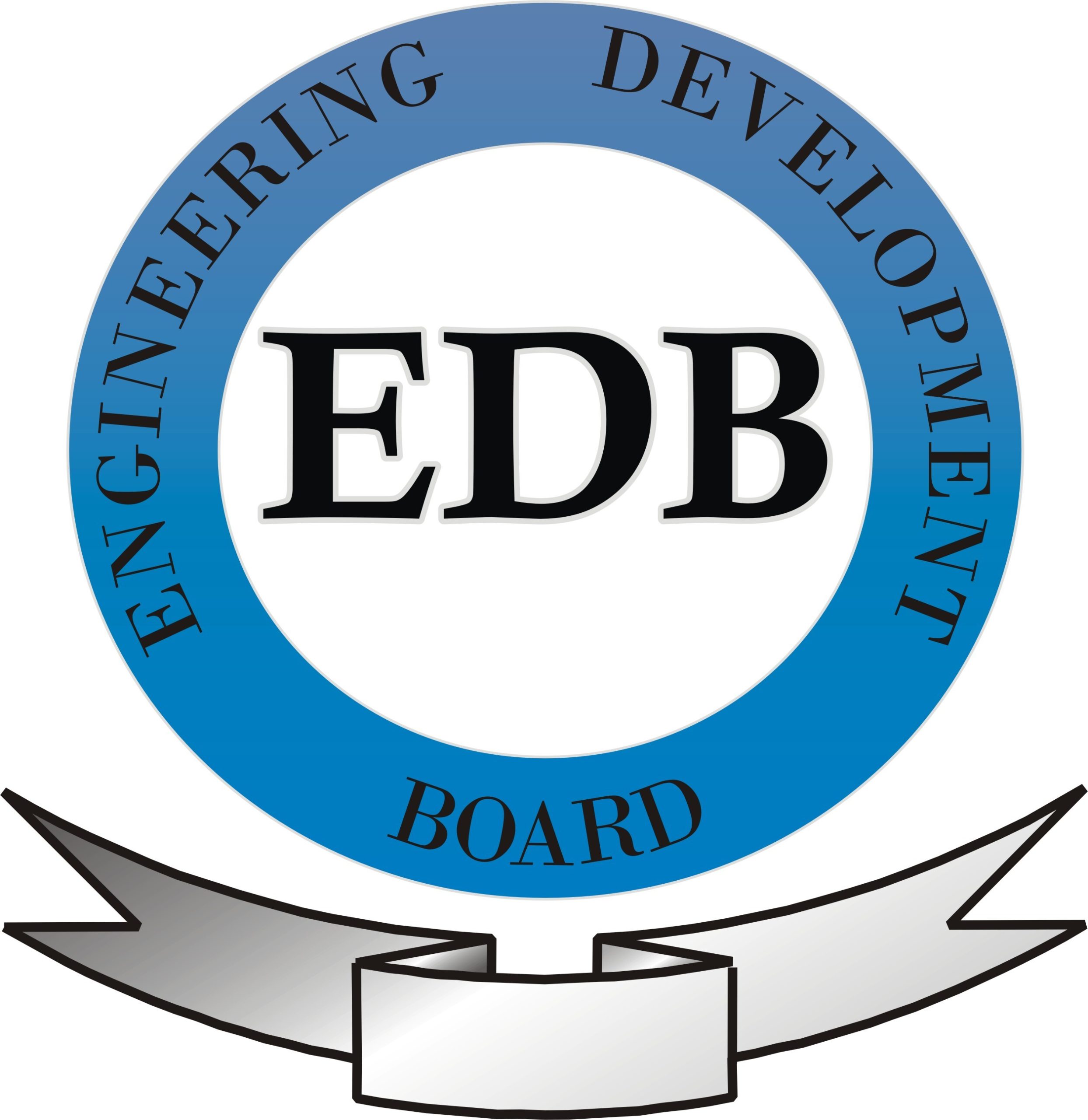Promoting Innovation & Exports: CEO EDB Addresses HVACR Expo 2026
The 31st Pakistan HVACR International Expo & Conference 2026 was successfully held from 12–14 February 2026 at the Karachi Expo Centre.
The event was graced by the CEO of the Engineering Development Board as Guest of Honour, who appreciated the scale, organization, and technological advancement showcased at the Expo. He emphasized the growing export potential of Pakistan’s HVACR sector and highlighted the importance of stronger industry–government collaboration to enhance global competitiveness.
Organized by the Pakistan HVACR Society, the three-day Expo brought together industry leaders, engineers, policymakers, academia, and international partners, serving as a key platform for innovation, sustainability, and climate-responsive infrastructure development.
The event reaffirmed the HVACR sector’s vital role in Pakistan’s industrial growth and future export expansion.
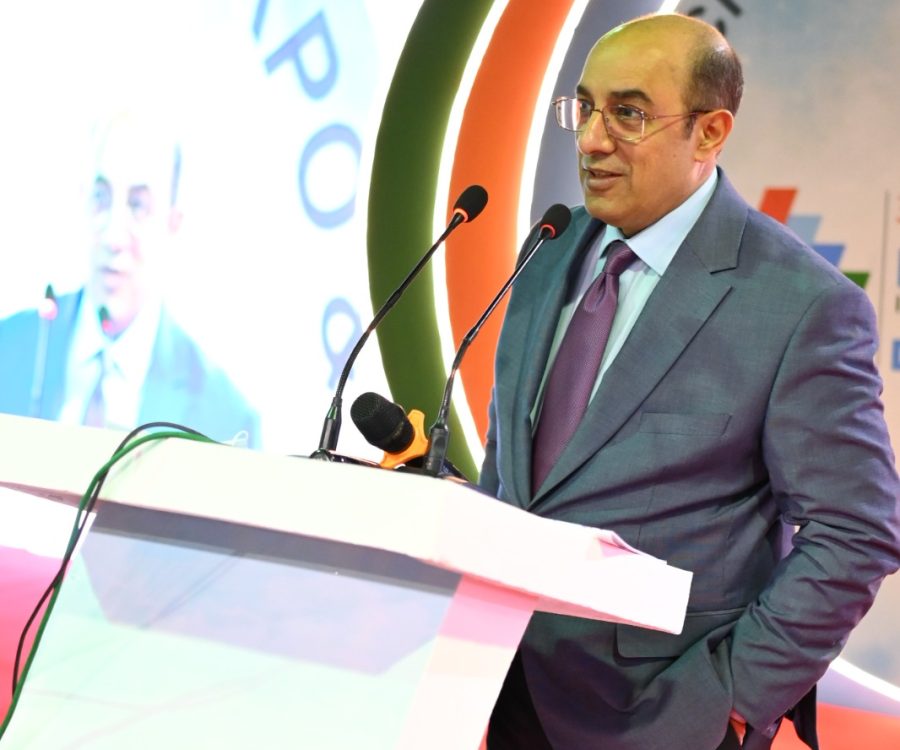
CEO EDB Mr. Hamad Ali Mansoor’s Visit to the Honda Factory in Sheikhupura
The Engineering Development Board (EDB) of Pakistan continues to play a pivotal role in driving the country’s engineering and manufacturing sectors toward global competitiveness. A major highlight of these efforts was the recent visit by Mr. Hamad Ali Mansoor, the Chief Executive Officer (CEO) of EDB, to the Honda manufacturing facility near Sheikhupura — a visit that underscores Pakistan’s aspirations to expand automotive production, boost exports, and strengthen public-private collaboration in the engineering sector.
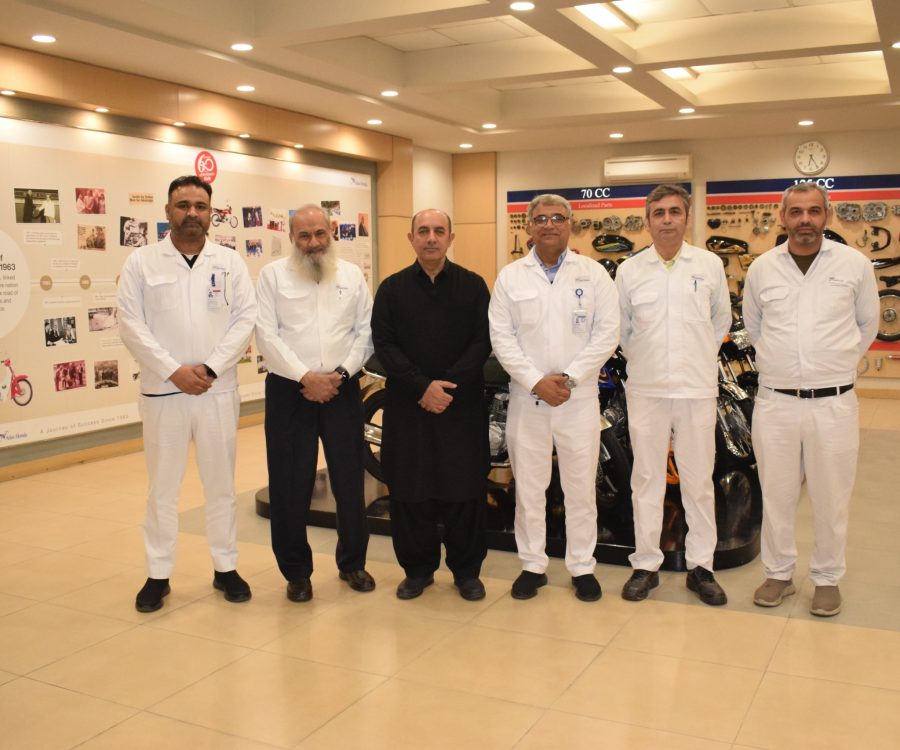

Gilani calls for Pak-brand vehicles and economical electric bikes
via (THE NEWS) : ISLAMABAD: Acting President Syed Yusuf Raza Gilani said that a locally manufactured made-in-Pakistan vehicle under a Pakistani brand, as well as economical electric bikes, may be introduced to promote affordable mobility and strengthen domestic manufacturing.
He said this in a meeting with Chief Executive Officer of the Engineering Development Board (EDB) Hamad Ali Mansoor who called on him at the Aiwan-e-Sadr on Thursday.
Hamad Ali Mansoor briefed acting president on the role and mandate of the Engineering Development Board, an apex body under the Ministry of Industries and Production, established in 1995 to strengthen Pakistan’s engineering sector. He outlined EDB’s key initiatives to promote industrial growth, enhance exports, support research and development, improve technical skills and align the sector with international standards.
Gilani for locally manufactured Pak-brand vehicle
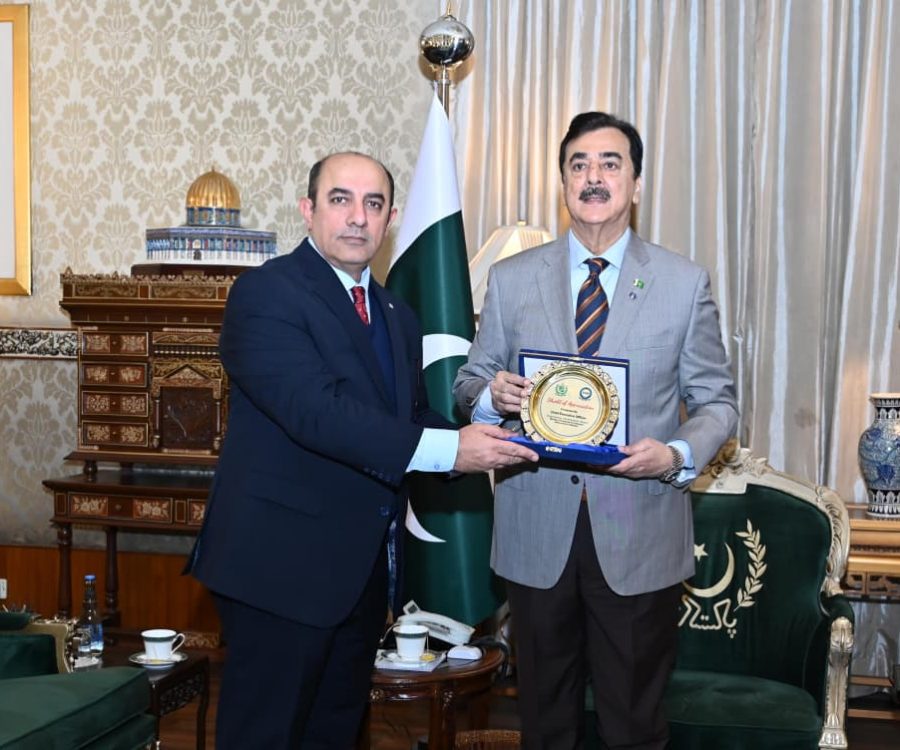
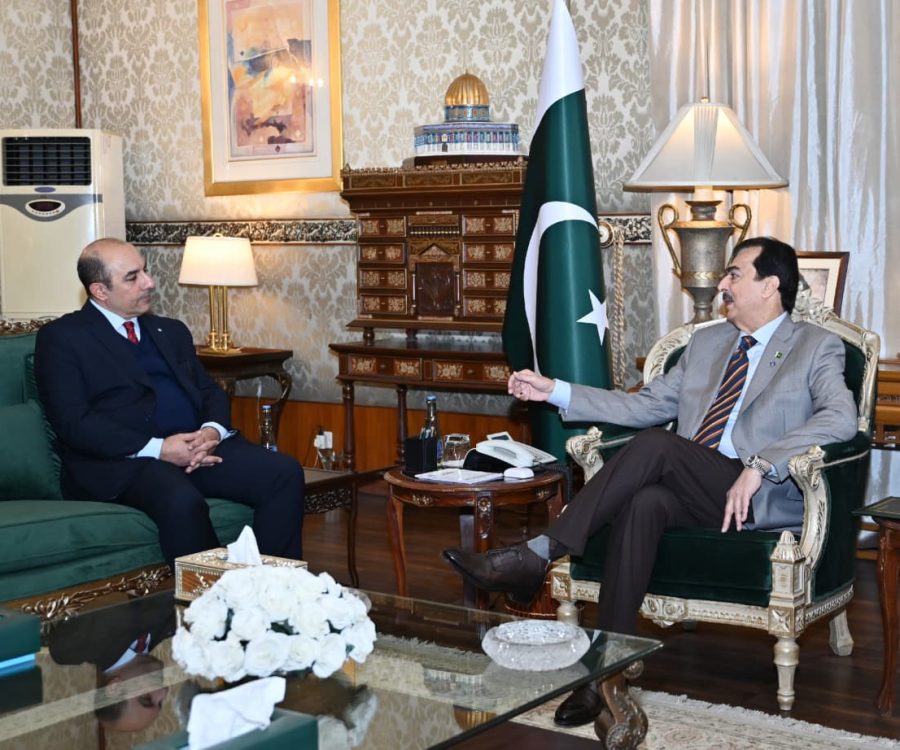
Gilani urges shift to electric vehicles
via DAWN: ISLAMABAD: Acting President Syed Yousuf Raza Gilani has stressed the importance of transitioning to electric vehicles to ensure a clean environment and support sustainable economic growth.
He said that a locally manufactured made-in-Pakistan vehicle under a Pakistani brand, as well as economical electric bikes, may be introduced to promote affordable mobility and strengthen domestic manufacturing.
The acting president reaffirmed the government’s commitment to supporting the engineering sector as a key driver of economic growth and industrial development. He expressed these views in a meeting with the Chief Executive Officer of the Engineering Development Board (EDB), Hamad Ali Mansoor, at the presidency.
The EDB head briefed Mr Gilani on the role and mandate of the Engineering Development Board, an apex body under the Ministry of Industries and Production, established in 1995 to strengthen Pakistan’s engineering sector.
He outlined EDB’s key initiatives to promote industrial growth, enhance exports, support research and development, improve technical skills and align the sector with international standards.
The CEO also apprised the acting president of ongoing policy measures, including long-term strategic planning, tariff rationalisation, industrial development frameworks, automobile and electric vehicle policies, as well as efforts to foster innovation, technology adoption and human resource development in the engineering industry.
Mr Gilani appreciated the proactive role of the Engineering Development Board in advancing Pakistan’s engineering sector.
CEO EDB Meets Senate Chairman (Acting President) Syed Yousaf Raza Gilani at Aiwan-e-Sadr
The Chief Executive Officer of the Engineering Development Board (EDB), Mr. Hamad Ali Mansoor, met with Acting President of Pakistan and Chairman Senate, Mr. Syed Yousaf Raza Gilani, at the President House (Aiwan-e-Sadr) today.
During the meeting, Mr. Mansoor briefed the Acting President on the role, mandate and key initiatives of the Engineering Development Board, which functions under the Ministry of Industries and Production to strengthen Pakistan’s engineering sector and promote industrial growth.

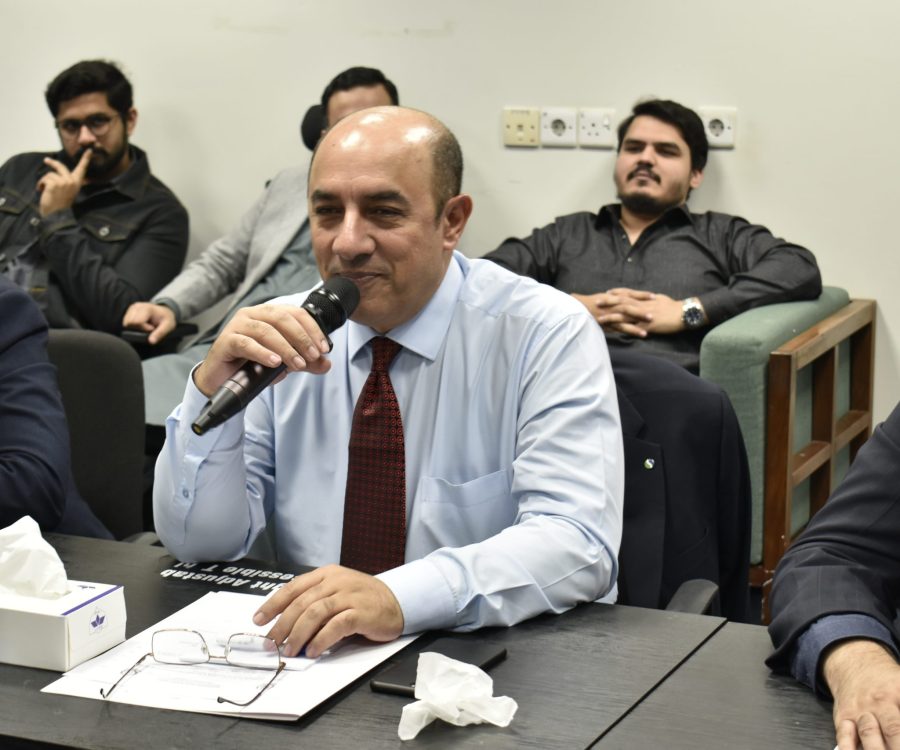
Shaping a Renewable Future: CEO EDB Hamad Ali Mansoor Leads Seminar at LUMS
Pakistan is undergoing a silent but powerful energy disruption driven by the rapid rise of Battery Energy Storage Systems (BESS). As the country faces growing energy demand, grid instability, and increasing penetration of solar and renewable energy, traditional power systems are no longer sufficient. Energy storage particularly lithium-ion based systems is emerging as a critical solution, enabling reliable power for electric vehicles, grid-scale applications, telecom infrastructure, off-grid communities, and industrial use. Pakistan’s energy storage market, once dominated by low-quality lead-acid batteries, is now shifting toward advanced, intelligent, and longer-life solutions. This transition presents a major opportunity for local BESS assembly and manufacturing, which can reduce costs, improve quality, create jobs, and strengthen energy security. However, success depends on balanced policies, strong safety and reliability standards, technology-driven manufacturing, and collaboration between industry, academia, and government. With the right approach, BESS can become the backbone of a resilient, renewable-rich, and future-ready energy system for Pakistan.
Chinese Delegation from Guangzhou Guanggao High Voltage Electric Apparatus Co., Ltd. (GG Group) Visits EDB.
A delegation from Guangzhou Guanggao High Voltage Electric Apparatus Co., Ltd. (GG Group) a leading Chinese enterprise specializing in electrical & electronics smart manufacturing and high-voltage equipment visited the Engineering Development Board (EDB) to discuss opportunities for industrial cooperation in Pakistan.
CEO EDB welcomed the delegation and underscored the significance of strengthening Pakistan–China industrial and economic ties. The GG Group team shared their vision of becoming a strategic value partner in Pakistan’s engineering and manufacturing sectors.
Further, CEO EDB also briefed the delegation on Pakistan’s industrial potential, investment prospects, and the government’s initiatives to promote localized manufacturing, technology transfer, and high-value engineering capabilities.
Both sides expressed strong interest in advancing collaboration in engineering, high-tech solutions, and industrial development. The CEO EDB reaffirmed the EDB full support for facilitating future cooperation and investment initiatives.
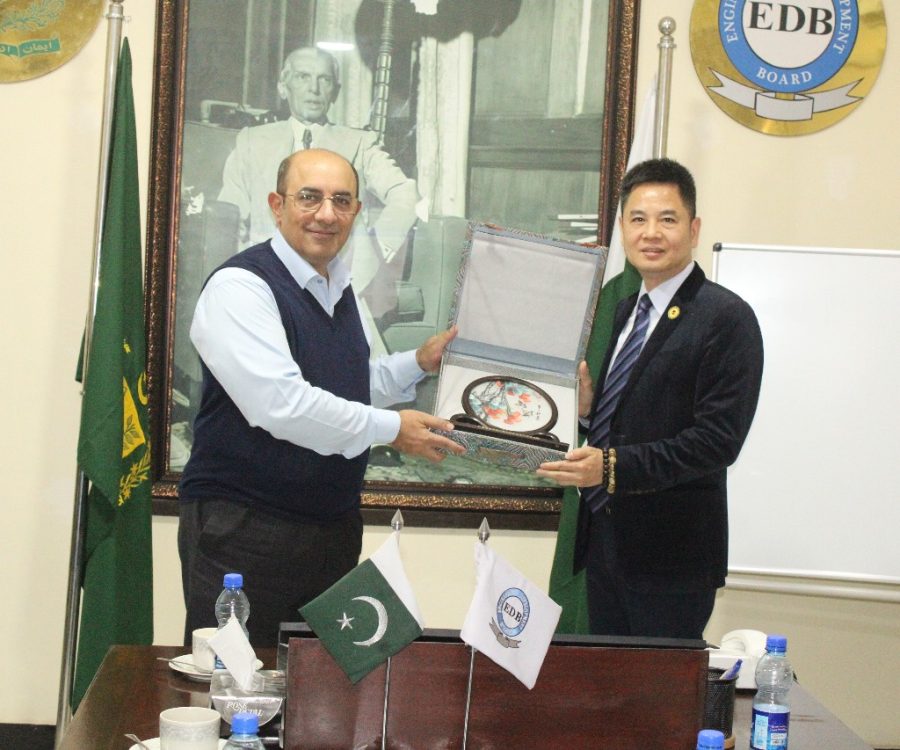
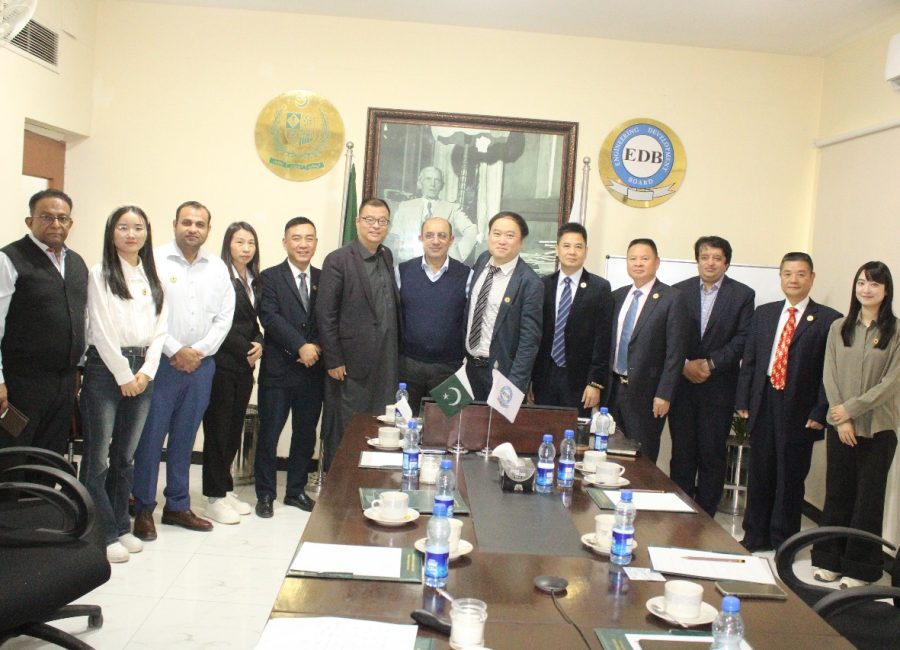
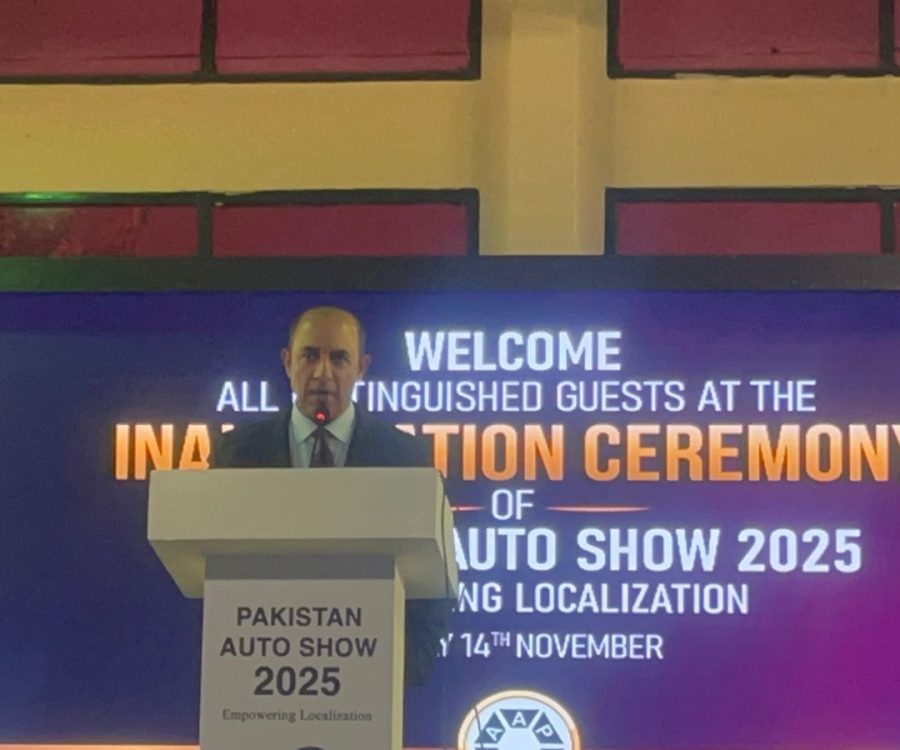
CEO, EDB Mr. Hamad Ali Mansoor Encourages Innovation and ‘Made-in-Pakistan’ Vehicle Exports
Engineering Development Board (EDB) Chief Executive Officer, Mr. Hamad Ali Mansoor encouraged auto parts manufacturers to innovate and secure international export orders, emphasizing the need for future focused strategies to enhance Pakistan’s automotive presence globally. He noted that local efforts could capitalize on technological advancements to compete effectively in the global market. He further emphasized to focus on exporting ‘Made-in-Pakistan’ vehicles, while inaugurating Pakistan Auto Show 2025 at the Expo Centre Karachi
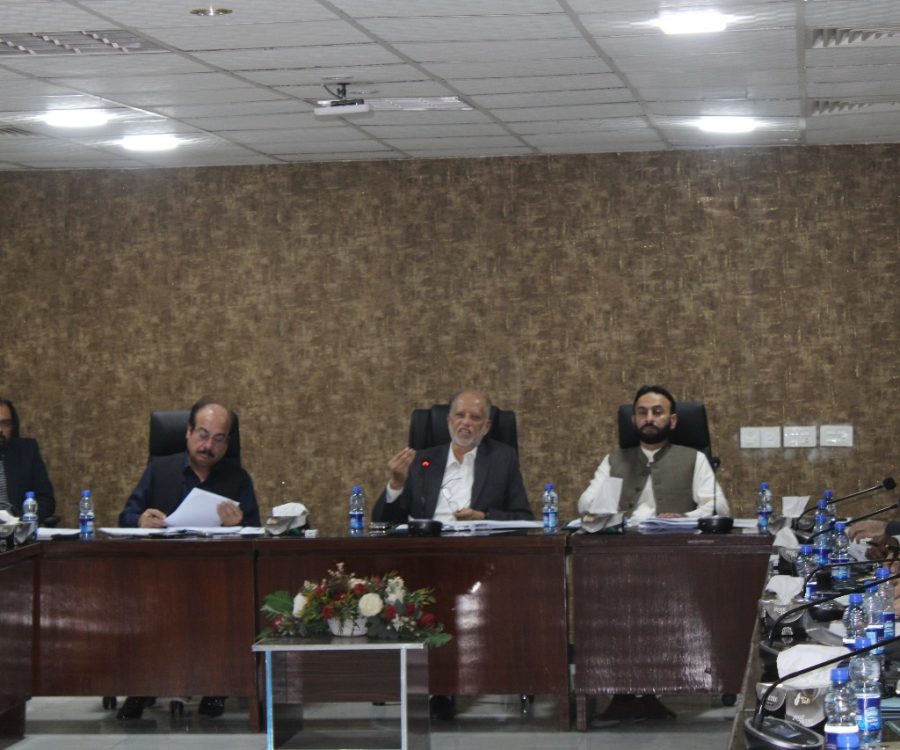
16th Meeting of the Senate Standing Committee on Industries and Production Held at EDB
Islamabad, October 14, 2025 — The 16th Meeting of the Senate Standing Committee on Industries and Production was held at the Engineering Development Board (EDB), Ministry of Industries and Production (MoIP). The meeting was chaired by the Honorable members of the Committee and attended by senior officials from MoIP, representatives of the EDB, and other relevant stakeholders.
During the session, the Engineering Development Board (EDB) briefed the Committee on the prevailing structure of the local automotive and tractor manufacturing sectors. The briefing focused on the factors contributing to the higher prices of locally manufactured vehicles compared to regional markets, as well as the overall fiscal and industrial framework influencing local production and affordability.
In conclusion, the presentation comprehensively addressed the Committee’s queries regarding automotive price disparities, the impact of fiscal policies, and the structure of local manufacturing. The EDB reaffirmed its commitment to promoting localization, rationalizing duties, and enhancing competitiveness in Pakistan’s automotive sector in alignment with regional benchmarks.
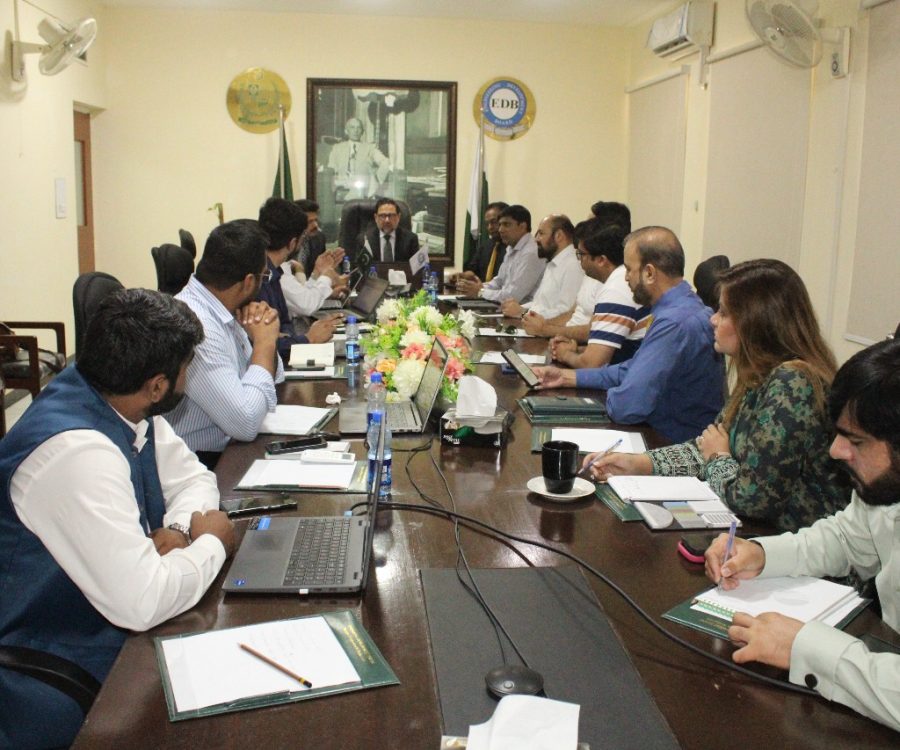
EDB Holds Pre-Meeting on E-Balloting of PAVE Scheme
On 30th September 2025, a meeting was held at the Engineering Development Board (EDB) regarding the e-balloting of the Pakistan Accelerated Vehicle Electrification (PAVE) Scheme. The session was attended by the Secretary, Additional Secretary, Joint Secretary, Ministry of Industries and Production (MoIP), the CEO of EDB, senior officers of EDB, and officials from MoIP. The Punjab Information Technology Board (PITB) team also participated to provide technical support for the e-balloting process.
The meeting focused on ensuring transparency, efficiency, and smooth execution of the e-balloting mechanism under the PAVE Scheme, in line with the government’s vision of promoting electrification and sustainable mobility across Pakistan.
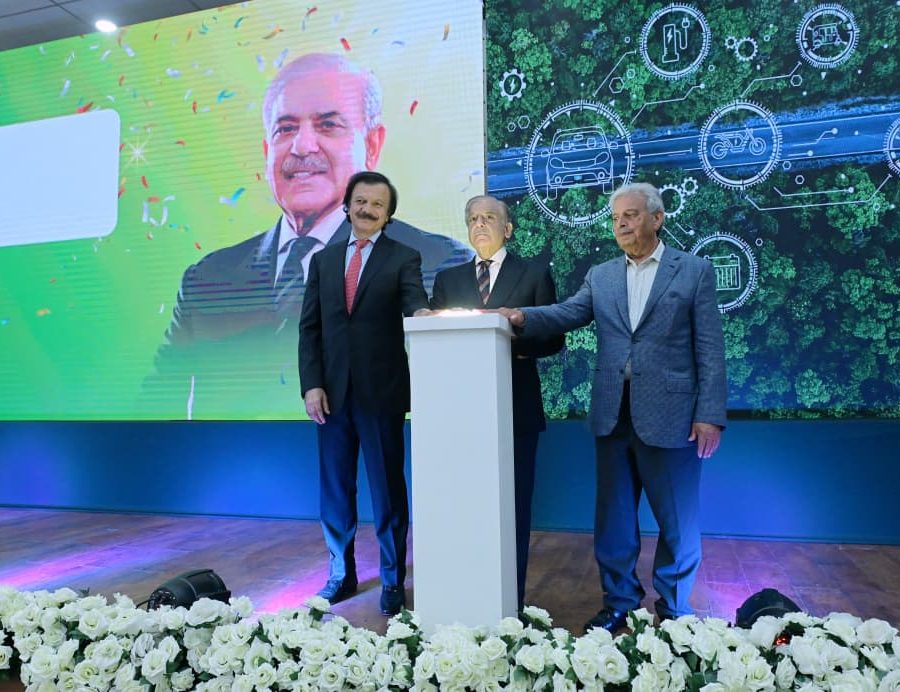
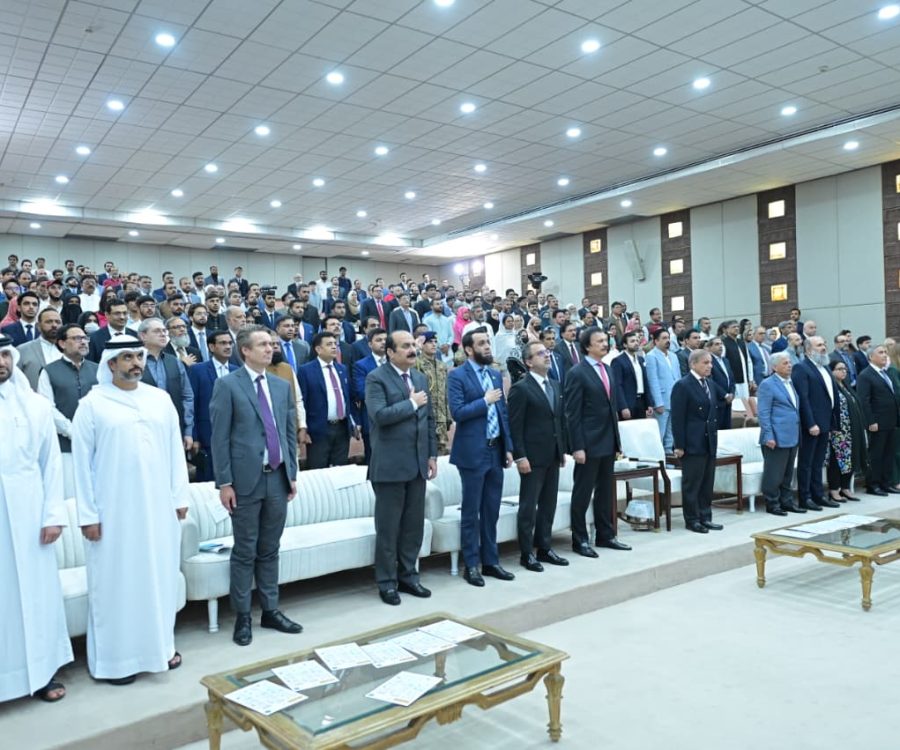
Launch of New Electric Vehicle (NEV) Policy 2025–2030 and Rollout of Pakistan Accelerated Vehicle Electrification (PAVE) Scheme
The Engineering Development Board (EDB), under the Ministry of Industries & Production, organized a landmark ceremony on 26th August 2025 at the Prime Minister’s Office, Islamabad, where the Government of Pakistan officially launched the New Electric Vehicle (NEV) Policy 2025–2030 along with the rollout of the Pakistan Accelerated Vehicle Electrification (PAVE) Scheme. As the implementing body, EDB will play a central role in translating this visionary policy and scheme into action, ensuring their economic, environmental, and social benefits are realized nationwide.
The event was presided over by the Honorable Prime Minister, Islamic Republic of Pakistan, Mr. Muhammad Shehbaz Sharif, alongside Special Assistant to the Prime Minister on Industries & Production, Mr. Haroon Akhtar Khan and Federal Minister for Ministry of National Food Security and Research, Mr. Rana Tanveer Hussain.
The NEV Policy 2025–2030 provides a comprehensive roadmap for sustainable mobility, industrial modernization, and clean energy adoption, with ambitious targets including achieving 30% of all new vehicle sales as electric by 2030. Complementing this, the PAVE Scheme is designed to provide subsidies and incentives for electric motorcycles, cars, and charging infrastructure, accelerating EV adoption and encouraging local manufacturing.
As a symbolic gesture of youth empowerment and sustainable innovation, the Prime Minister distributed 200+ electric scooters to top-performing students from across the country, linking academic excellence with Pakistan’s clean mobility vision.
The ceremony drew strong participation from ambassadors, federal ministers, chairman board across the country, international financial institutions, industry leaders, and key stakeholders demonstrating global confidence in Pakistan’s green transition strategy.
With the launch of the NEV Policy 2025–2030 and the rollout of the PAVE Scheme, Pakistan has taken a historic step towards cleaner growth, energy security, and inclusive development, firmly positioning itself as a responsible global partner in
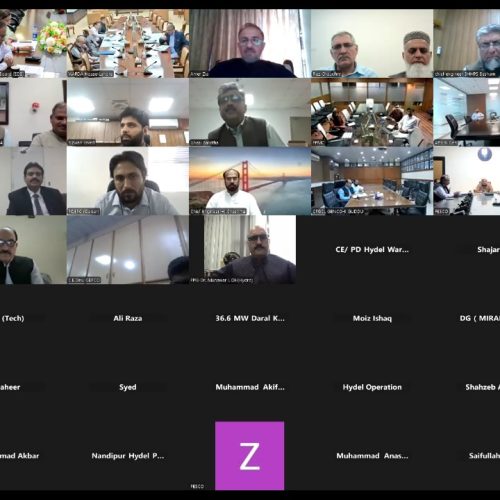
Awareness Webinar on
Power Sector Indigenization Plan (PSIP) hosted by EDB and LUMS
The minister’s visit to the Engineering Development Board (EDB) was all about exploring ways to work together in advancing the electric motorcycle sector. The discussions highlighted the importance of sustainable transportation and how cutting-edge technology, research, and local manufacturing can help achieve that goal.
A standout moment of the visit was the announcement that 100 electric motorcycles will be given to top-performing students across the country. This thoughtful gesture not only celebrates their achievements but also promotes eco-friendly commuting.
The EDB showcased electric motorcycles as a key part of the Prime Minister’s vision to expand the use of electric vehicles in Pakistan. While four-wheel electric vehicles are gaining traction, the two- and three-wheeler industries have already made remarkable progress, with local manufacturers achieving success in production and exports, especially in three-wheelers.
The visit wrapped up with exciting commitments to set up task forces, launch pilot projects, and collaborate internationally. It’s clear there’s a shared passion for innovation and sustainability driving this initiative forward.
